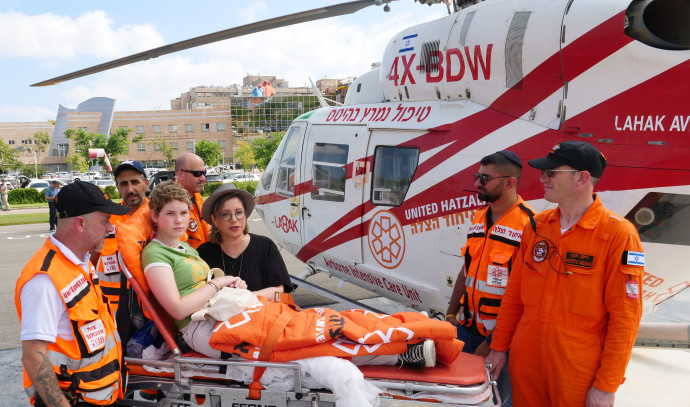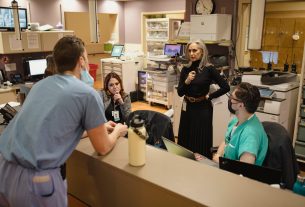|
Getting your Trinity Audio player ready...
|
When cancer patients develop a fever, an annoying cold or another acute problem, they need to go urgently to a hospital for antibiotics or other therapy because chemotherapy shuts down their immune systems until the treatment ends.
For such patients, getting help, follow-up appointments and testing can often last up to several hours. This is a very difficult situation for people who live close to the hospital, but for those living in the periphery, where the closest hospital option for them may include several hours of driving in each direction, the situation can quickly become impossible and is even worse for families with small children. What should take just a few hours for the treatment or appointment turns into an all-day event and can even force the patient to sleep in the hospital overnight if there if there are follow-up treatments the next day.
In partnership with Lahak Aviation and Sheba’s Safra Children’s Hospital, United Hatzalah initiated a pilot project to fly cancer patients from Israel’s outlying areas to receive treatment at hospitals in central Israel using its fleet of helicopters and to take them home.
Helping Israelis in the periphery receive cancer treatment with helicopters
“My husband and I often have a tough time deciding which of us should go with Raaya, our 16-year-old daughter who has suffered from bone cancer for the last year and a half, to her treatments and who should stay home to care of our other children,” said Michal Geller who lives in Hispin on the Golan Heights. “It is heart-wrenching every time.”
This problem has existed for a very long time, and until now there was no solution in sight until recently, when the CEO of the emergency medical rescue organization United Hatzalah (UH) Eli Pollack and its president and founder Eli Beer, decided that they were going to help cancer patients living in the periphery by doing what the organization does in the field.
“Our goal, together with our partner Lahak, is to cut down response time so that people don’t have to wait to receive medical treatment,” Beer said. “While we have been focusing on emergency medical response, we decided to undertake a new pilot project involving our helicopters that will cut down on travel time for families and children living with cancer. We hope that by cutting down the transport time, the patients and their families will benefit from a much easier journey and that it will free them from the time constraints included in traveling three or four hours to the hospital.”
The project is still in its testing and pilot stage, but if it works, then UH hopes to be able to make it a permanent project. “This is incredibly important and even results in lives being saved, because if these patients are exposed to germs or viruses while traveling to or from the hospital, the results can be catastrophic. These children deserve a faster way to receive their treatments. If a way exists to get them to the hospital faster, whether it is an urgent emergency or just for a regular treatment or checkup, then we need to do it. Until that happens, UH is stepping in to fill this essential service and cut down the travel time for these children.”
Raaya’s father, Dov, added that “this is an incredibly important project, especially for children, because the hospitals in northern Israel, Poriya (Tiberias), Ziv (Safed), Emek (Afula) and others lack a pediatric oncology department. We have to take her to the center of the country to receive treatment. We shouldn’t live in a society where a child’s life from Givatayim is worth more than one from the periphery, but that seems to be what is happening in practice. I remember one time when Raaya developed a fever and we took her to Poriya, which was the closest one. After waiting for a while, they sent us back to Safra Hospital for treatment because they couldn’t help us.”
“This is scary for me,” Raaya added. “We were told that we need to be in the hospital within half an hour, and there is simply no way to do that. It was a bit weird for me now arriving in 40 minutes. I recall one trip back from the hospital after a treatment cycle that lasted a week. I was feeling awful, suffering from severe nausea; I vomited a lot on the ride. It took hours of suffering through that trip just to get home so I could recuperate a little. Had there been a helicopter available to take me then, it would have helped immensely, because, even though I likely still would have been nauseous, my suffering would have been cut down to 40 minutes, instead of four hours.”
Last Thursday, Raaya was flown in one of the Lahak/UH helicopters and was able to reach her appointments on time and return home by mid-afternoon. Accompanied the entire way by an expert medical team and the Lahak pilot who were all caring was simply a great experience, the parents said. It was much better than driving down the highway that was full of traffic jams.
The pilot project will continue with another flight for a young cancer patient from Israel’s southern Negev region in the coming weeks and after that, the project will undergo a final review before becoming a regular mainstay of operation for the organization with the hopes that it will include other hospitals as well.



